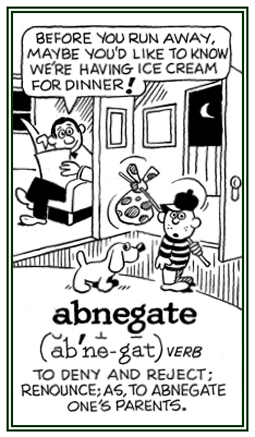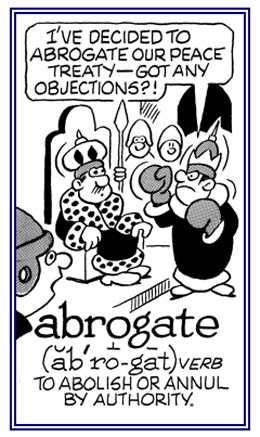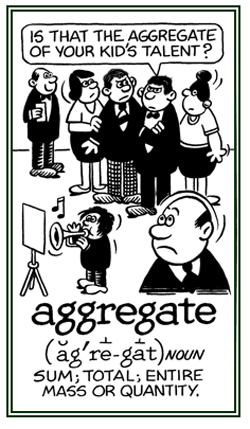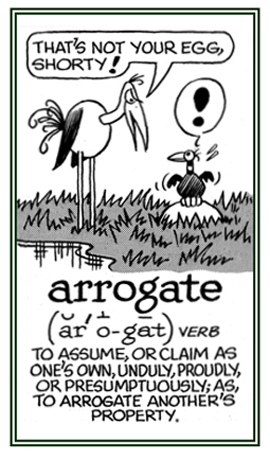-gate +
(Latin: a suffix; from agere to set in motion, to drive, to lead; to do, to act)
2. To deny something to oneself; to restrain, especially from indulging in some pleasure: The minister of the church abnegated the material luxuries of life.
When Agnes Marcia became a nun after the deaths of her son and husband in an auto accident, she was abnegating a life of comfort and ease in order to dedicate her life to God.
Indulging in an ice cream sundae abnegates the healthful effects of having a salad for lunch.
Because Lucy wants to lose weight, she is abnegating the consumption of so much food during her meals.


Go to this Word A Day Revisited Index
so you can see more of Mickey Bach's cartoons.
The Secretary of State declared that further aggressive action by a certain foreign power would cause the government to abrogate the treaty it had made with that country.
Mr. Jackson and the Board of Directors at the museum decided to abrogate entrance fees for senior citizens.
2. To repeal, to eliminate, or to get rid of something formally and publicly, especially a law: The king decided to abrogate the old law regarding poaching during the summer holidays.The new law abrogated the old law about paying parking fines.
They will be abrogating the decision to increase student grants after the next election.
3. Etymology: from Latin ab-, "away" + rogare, "to ask, to propose".


Go to this Word A Day Revisited Index
for a list of additional Mickey Bach illustrations.
2. Etymology: from Latin aggregat-, "herded together"; from the verb aggregare, "to group together"; from ad, "toward" + grex, "flock".

Go to this Word A Day Revisited Index
so you can see more of Mickey Bach's cartoons.
2. To attach; to bind.
Some presidents have arrogated to themselves the power of Congress to declare war.
2. To assign or to attribute to another person without justification: Judge Hendricks accused Jane of arrogating to herself the power and the right to punish people.


Go to this Word A Day Revisited Index
so you can see more of Mickey Bach's cartoons.
2. Etymology: from Latin castigatus past participle of castigare, "to purify, to chastise"; from castus, "pure" + agere, "to do". Used in the sense of "to make people pure by correcting or reproving them."

Go to this Word A Day Revisited Index
so you can see more of Mickey Bach's cartoons.
2. To move around by walking, driving, etc.

A man is striving to circumnavigate a stone structure in an effort to get away from the threatening sharks.
2. To collect or to separate people or things into an assemblage or to get together: Slowly the crowd started to congregate in the park for the afternoon concert.
3. To bring into one place, or into a throng or united body; such as, people or animals: The sheep were congregated in the pen, waiting to be let out into the pasture.
